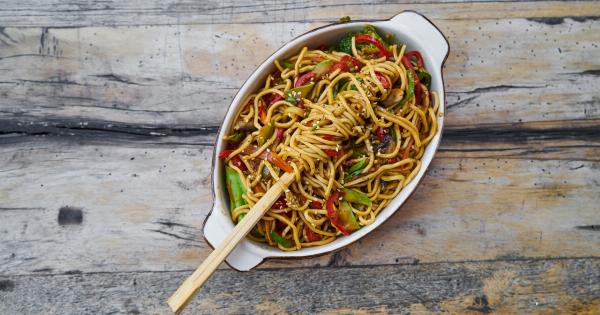When it comes to healthy eating, vegetables play a crucial role in providing essential vitamins, minerals, and fiber. However, there has always been a debate around the question of whether cooked or raw veggies are more nutritious.
Some argue that cooking vegetables enhances their nutrient content, while others believe that raw vegetables retain more of their original nutrients. So, let’s dive into this topic and uncover the truth behind whether cooked or raw veggies are the better choice for maximizing our nutrition.
1. Nutrient Retention in Cooking
Cooking vegetables often involves heat and water, which can potentially lead to nutrient loss. Water-soluble vitamins like vitamin C and B vitamins are particularly susceptible to degradation when exposed to heat.
Additionally, minerals can leach into cooking water, reducing their overall content in cooked vegetables.
However, not all nutrients are negatively affected by cooking. Some vegetables contain components called carotenoids, such as beta-carotene, which are more easily absorbed by our bodies after cooking.
This is because heat breaks down the cell walls of vegetables, making it easier for our bodies to access and absorb these nutrients.
2. Digestibility and Antinutrients
Raw vegetables can be harder to digest for some individuals, leading to discomfort and digestive issues. Cooking vegetables can be beneficial as it helps to break down the tough fibers in vegetables, making them easier to digest and absorb.
Thus, cooked vegetables may be more suitable for people with sensitive digestive systems or those who find raw vegetables hard on their stomach.
Moreover, cooking vegetables can help reduce the levels of antinutrients present. Antinutrients are compounds found in some plant foods that can interfere with the absorption of nutrients in our bodies.
For instance, cooking legumes can help reduce levels of phytic acid, improving the bioavailability of minerals like iron, zinc, and calcium. The reduction of antinutrients by cooking can enhance the overall nutritive value of vegetables.
3. Impact on Antioxidant Activity
Antioxidants are compounds that play a vital role in protecting our cells from damage caused by harmful molecules called free radicals. Many vegetables, especially leafy greens, are known for their high antioxidant content.
The impact of cooking on the antioxidant activity in vegetables is a topic of ongoing research.
Some studies suggest that cooking can lead to a decrease in antioxidant levels due to heat sensitivity. However, other research indicates that the heat from cooking can enhance antioxidant activity in certain vegetables.
For example, the antioxidant lycopene in tomatoes becomes more accessible and better absorbed by our bodies when they are cooked.
4. Cooking Methods and Nutrient Loss
Not all cooking methods have the same effect on vegetable nutrient content. The choice of cooking method can significantly impact the final nutritional profile of vegetables.
Boiling vegetables in water can result in significant nutrient loss, as the water-soluble vitamins and minerals leach out into the cooking water. However, steaming vegetables can be a better option, as it preserves more of the nutrients.
Alternatively, blanching vegetables by briefly immersing them in boiling water can help retain their color, flavor, and some nutrient content.
Stir-frying and sautéing vegetables in a small amount of oil are also popular methods. While these methods can cause some nutrient loss, the presence of oil can enhance the absorption of fat-soluble vitamins and certain antioxidants.
Moreover, grilling or roasting vegetables can help to intensify their flavors while retaining some nutrients.
5. Individual Vegetable Differences
It is important to note that not all vegetables respond to cooking in the same way. Each vegetable has a unique nutrient composition, and the impact of cooking can vary depending on the specific nutrients present.
For example, cruciferous vegetables like broccoli and cauliflower contain an enzyme called myrosinase. This enzyme activates the conversion of some beneficial compounds, such as sulforaphane, which has been linked to numerous health benefits.
Cooking these vegetables can diminish the activity of myrosinase, thereby reducing the potential benefits. However, lightly steaming these vegetables maintains myrosinase activity while increasing the digestibility of their tough fibers.
6. The Case for Raw Veggies
While cooking vegetables have its benefits, there are also reasons why some people prefer to consume veggies raw.
Raw vegetables generally have a crunchier texture and a fresher taste, which can be appealing to many.
Additionally, raw veggies can provide a significant amount of dietary fiber, which contributes to digestive health and helps maintain healthy cholesterol levels.
Moreover, certain vitamins, like vitamin C, are heat-sensitive and can be diminished through the cooking process. Raw vegetables can be an excellent way to obtain these vitamins in their highest possible amounts.
7. The Case for Cooked Veggies
While raw veggies have their advantages, cooking vegetables can bring about numerous benefits as well.
Cooking vegetables makes them more palatable for some people, making it easier to incorporate them into one’s daily diet. This can be particularly beneficial for individuals who struggle with taste or texture of certain raw vegetables.
Additionally, cooking certain vegetables can release more antioxidants and make them easier for our bodies to absorb.
For instance, cooking tomatoes increases the bioavailability of lycopene, a potent antioxidant associated with various health benefits.
8. Striking a Balance
When it comes to consuming vegetables, it is important to strike a balance between cooked and raw options to maximize the nutritional benefits.
While heating vegetables can lead to nutrient loss, the impact varies depending on the vegetable and cooking method used. Some vegetables are more nutritious when cooked, while others are better consumed raw.
Experimenting with different cooking methods, such as steaming, stir-frying, or roasting, can help you find the best balance between taste, texture, and nutritional value.
9. Conclusion: Cooking Vs. Raw Veggies
There is no definitive answer as to whether cooked or raw vegetables are more nutritious. Both cooking and eating veggies in their raw form offer various advantages and can contribute to a healthy diet.
Cooking vegetables can enhance digestion, nutrient absorption, and the release of certain antioxidants. On the other hand, raw vegetables offer higher levels of heat-sensitive nutrients and dietary fiber.
To reap the maximum benefits, it is recommended to enjoy a combination of both cooked and raw vegetables in your daily meals. This will allow you to obtain a wide range of nutrients while enjoying a diverse and delicious array of vegetables.






























